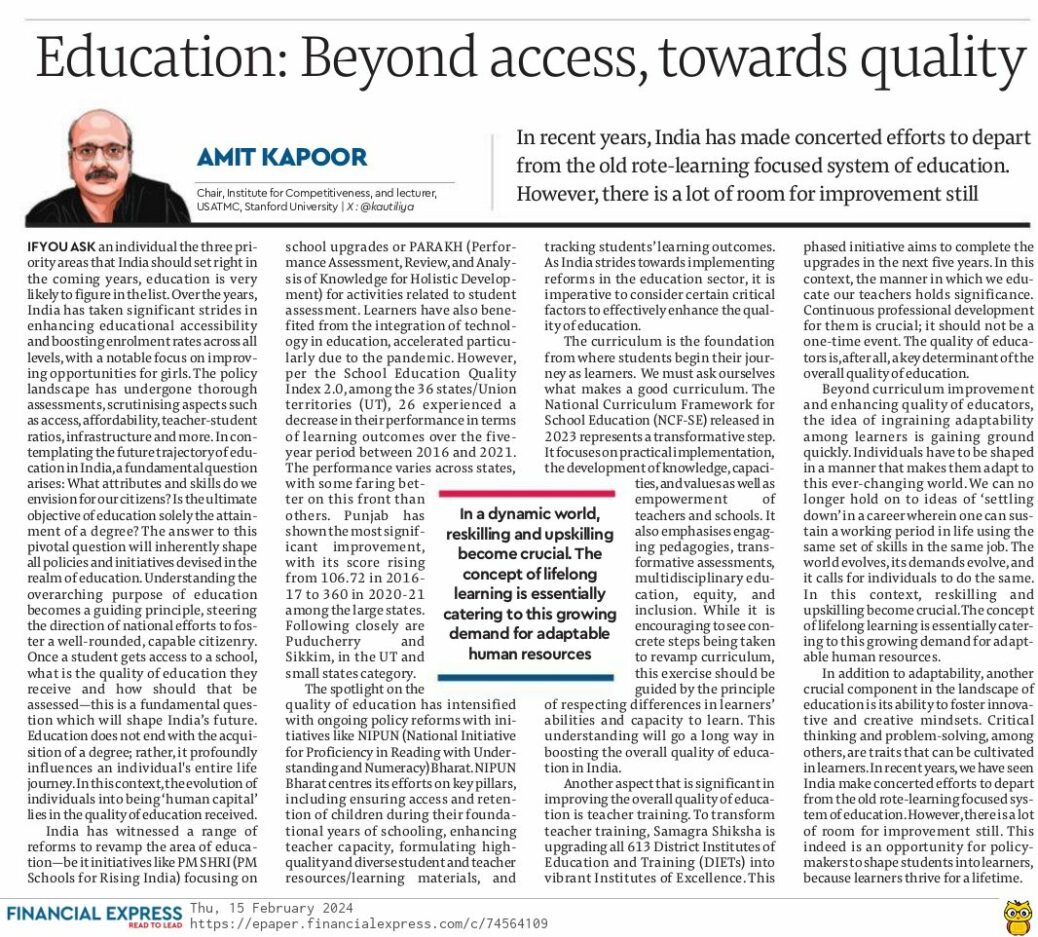If you ask an individual what are the top three priority areas that India should set right in the coming years, education is very likely to figure in this list. Over the years, India has taken sgnificant strides in enhancing educational accessibility and boosting enrollment rates across all levels, with a notable focus on improving opportunities for girls. The policy landscape has undergone thorough assessments, scrutinizing aspects such as access, affordability, teacher-student ratios, infrastructure, and more. In contemplating the future trajectory of education in India, a fundamental question arises: What attributes and skills do we envision for our citizens? Is the ultimate objective of education solely the attainment of a degree? The answer to this pivotal question will inherently shape all policies and initiatives devised in the realm of education. Understanding the overarching purpose of education becomes a guiding principle, steering the direction of national efforts to foster a well-rounded, capable citizenry. Once a student gets access to a school, what is the quality of education they receive and how should that be assessed – this is a fundamental question which will shape India’s future. Education does not end with the acquisition of a degree; rather, it profoundly influences an individual’s entire life journey. In this context, the evolution of individuals into being ‘human capital’ lies in the quality of education received.
India has witnessed a range of reforms to revamp the area of education – be it initiatives like PM SHRI (PM Schools for Rising India) focus on school upgrades, or PARAKH (Performance Assessment, Review, and Analysis of Knowledge for Holistic Development) for activities related to student assessment. Learners have also benefited from the integration of technology in education, accelerated particularly due to the pandemic. However, as per the School Education Quality Index 2.0, among the 36 states/UTs, 26 experienced a decrease in their performance in terms of learning outcomes over the five-year period between 2016 and 2021. The performance varies across states, with some faring better on this front than others. Punjab has shown the most significant improvement, with its score rising from 106.72 in 2016-17 to 360 in 2020-21 among the large states. Following closely are Puducherry and Sikkim, falling under the Union Territories and small states category. The spotlight on the quality of education has intensified with ongoing policy reforms with initiatives like NIPUN (National Initiative for Proficiency in Reading with Understanding and Numeracy) Bharat. NIPUN Bharat centers its efforts on key pillars, including ensuring access and retention of children during their foundational years of schooling, enhancing teacher capacity, formulating high-quality and diverse Student and Teacher Resources/Learning Materials, and tracking students’ learning outcomes. As India strides forward in implementing reforms in the education sector, it is imperative to consider critical factors that should be kept in mind to effectively enhance the quality of education.
The curriculum is the foundation from where students begin their journey as learners. We must ask ourselves what makes a good curriculum. The National Curriculum Framework for School Education (NCF-SE) released in 2023 represents a transformative step. It focuses on practical implementation, the development of knowledge, capacities, and values, and empowerment of teachers and schools. It also emphasizes engaging pedagogies, transformative assessments, multidisciplinary education, equity, and inclusion. While it is encouraging to see concrete steps being taken to revamp students’ curriculum, this exercise should be guided by the principle of respecting differences in learners’ abilities and capacity to learn. This understanding will go a long way in boosting the overall quality of education in India. Another aspect that is significant in improving the overall quality of education is teacher training. To transform teacher training, SamagraShiksha is upgrading all 613 District Institutes of Education and Training (DIETs) into vibrant Institutes of Excellence. This phased initiative aims to complete the upgrades in the next five years. The scheme will commence in FY 2023-24, starting with around 120 DIETs. In this context, it is important to note that the the manner in which we educate our teachers holds significance. Continuous professional development for them is crucial; it should not be a one-time event. The quality of educators is, afterall, a key determinant of the overall quality of education.
Beyond curriculum improvement and enhancing quality of educators, the idea of ingraining adaptability among learners is fast gaining ground. Individuals have to be shaped in a manner that makes them adapt to this ever-changing world. We can no longer hold on to ideas of ‘settling down’ in career wherein one can sustain a working period in life using the same set of skills in the same job. The world evolves, its demands evolve, and it calls for individuals to do the same. In this context, reskilling and upskilling become crucial. The concept of lifelong learning is essentially catering to this growing demand for adaptable human resources. In addition to adaptability, another crucial component in the landscape of education is its ability to foster innovative and creative mindsets. Critical thinking, problem-solving, among others, are traits that can be cultivated in learners. In recent years, we have seen India make concerted efforts to depart from the old rote-learning focused system of education. However there is huge room for improvement still. This indeed is an opportunity for policymakers to shape students into learners, because learners thrive for a lifetime.
The article was published with Financial Express on February 15, 2024.
























